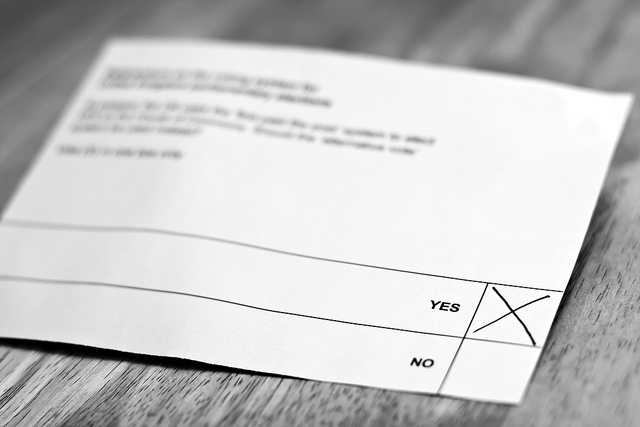Debate part 2: should adding ‘None of the Above’ to ballot papers be a priority for UK political reformers?
Democratic Audit UK recently hosted part one of a debate between Emma Rome and Richard Berry on the pressing need – or otherwise – to add a ‘None of the Above’ option to UK ballot papers. Proponents argue that true democracy cannot exist without this option, whereas sceptics argue that the measure would have a marginal impact and that political reformers should have far greater priorities. Part one can be found here.

Credit: CGP Grey, CC BY 2.0
Dear Emma,
You paint a vivid scenario for how NOTA will affect electoral dynamics. But I think there is an assumption there, which I don’t find convincing: that significant numbers of people will want to vote for ‘none of the above’ if this option becomes available.
The comparison with proportional representation is important. If the 2010 General election had been contested under PR, the composition of Parliament would be very different. For instance, there would be a couple of dozen UKIP or Green MPs. We don’t have to make any assumptions about voter behaviour in order to know that, just count the votes that were cast.
If I had any degree of certainty that NOTA would have a similar effect, I might be more favourable towards it. But even after voters become accustomed to it, I honestly can’t see more than a handful of people choosing it under normal circumstances (certainly below 5%). The implication is that parties would have no reason to change, because NOTA would rarely be a viable threat.
Regards,
Richard
Dear Richard,
It is my belief that significant numbers of people voting for NOTA would not be required for it to have the desired effect. In fact, in an ideal world, NOTA would receive very few votes, because the candidates presented to voters would all be more desirable than a literal none of the above.
One significant NOTA election result in the western world was the Nevada Senate elections in 1998 and 2012, where the number of votes for NOTA was far greater than the margin of victory. However, in Nevada, NOTA is without “teeth”, in that votes for “none of these candidates” have no effect on the actual outcome, which vastly limits the likely turnout for NOTA (an individual voter has no real or theoretical gain in voting for NOTA there, and loses an hour or two of his life by making that effort to do so). Despite this, support for that option remains high, with many people in other US states wanting it.
In Serbia, “none of the above” actually won a seat in 2012, although that appears to be a regular party standing on an anti-corruption platform rather than a election reform campaign or a formalised “none of the above” election process. Where protest candidates have stood as independents under the name “none of the above” or some variation, there have been multiple cases where they have beaten other serious candidates. In Spain, various activists stand under a “blank seats” banner, and pledge not to take the seat if they win, forcing the district to remain un- or under-represented. They have won on multiple occasions.
But possibly the greatest effect NOTA had was in the fall of Communism in Poland and Russia. Of the Polish seats which were limited to the communist party and its satellite parties, NOTA won in 33 out of 35 seats. This, as much as Solidarnosc’s landslide win, helped bring about the end of communism in Poland. In Russia’s 1991 election for their Congress of People’s Deputies, NOTA won in 200 of the 1500 seats contested in the first round of voting. Unlike the NOTA victories in Poland, these seats were freely contestable by any party or independent.
I would certainly hope that NOTA would receive very few votes, because that would mean the views of the candidates were close to those of the voters. But NOTA has demonstrable value in removing candidates and even entire parties that are sufficiently unpopular. However, these results (especially in Poland and Russia) do demonstrate that where incumbents and candidates are sufficiently unpopular and the option has electoral consequences, NOTA can and does get significant numbers of votes.
You have raised PR as an alternate election reform. In truth, I actually want both of these. And there is no reason we can’t have both. Take the ERS’s favoured form of PR: NOTA could be an option on the list, and in addition to the trailing candidate being eliminated in each run-off round of counting, any candidate who fails to be NOTA in that round would likewise be eliminated from further rounds. Election reform is not an either/or proposition; we can have both.
Regards,
Emma
Dear Emma,
Of course, we should celebrate the role NOTA played in helping bring down communist dictatorship in Poland and Russia. But the situation there was completely different to the situation facing the UK today.
For all its faults, the UK is a functioning liberal democracy. You say NOTA has “demonstrable value in removing candidates and even entire parties that are sufficiently unpopular.” Maybe so, but we already have a well-proven method of doing that: competitive elections. We need to make those elections more inclusive, and increase the influence of voters, but we have nobody to overthrow except ourselves.
I don’t have a principled objection to NOTA, which seems to me a rather minor, technical reform. I agree we don’t have to choose between reforms, but people do have to prioritise their campaigning efforts. There are lots of other reforms which more directly address the problems facing UK democracy.
This will be my last contribution. Thanks for taking part in the debate, it has been really interesting. I can’t say that I am convinced that NOTA is an answer to our problems but I do have a more positive view of its value now.
Regards,
Richard
Dear Richard,
Certainly, the UK likes to think of itself as a functioning liberal democracy. To a large extent it is (and long may it remain so), but the two largest parties are increasingly similar in their policies. Notably, according to the chart at the bottom of this page, the major parties in the UK have slowly shifted positions to be both more authoritarian and neo-liberal and closer to each other. The narrowing of opinions within UK political debate is both real and measurable.
According to Political Compass, the four parties that have received the most media airtime are all authoritarian and neo-liberal. That leaves 75% of conceivable combinations with no effective representation. There’s a democratic deficit in that all the people whose views fall into that 75% have no party that is sufficiently organised to give them a voice. The Green Party cannot realistically hope to represent such a vast ideological space on its own.
It is hard to say whether the major parties are in that quadrant because that is where most voters have their interests, or because the potential voters in the other quadrants have become disillusioned with politics (I suspect a mixture of both). Having NOTA would enable people in that wide space to have a legitimate reason to turn up and vote, which would then help us see just why our election turnouts have been steadily decreasing for decades, and possibly even prompt new parties to appear that could represent their interests; a NOTA turnout in this case would demonstrate to any potential new party that there is a politically interested but unrepresented voter base out there. That is something that PR alone can not do.
Richard, it has been a pleasure debating with you.
Regards,
Emma
—-
Note: part one of this exchange can be found here. The views expressed here represent the views of the participants and not those of Democratic Audit UK or the LSE. Please read our comments policy before posting.
—
 Richard Berry is a Research Associate at Democratic Audit and the LSE Public Policy Group. He is a scrutiny manager for the London Assembly and also runs the new Health Election Data website. View his research at richardjberry.com or find him on Twitter @richard3berry.
Richard Berry is a Research Associate at Democratic Audit and the LSE Public Policy Group. He is a scrutiny manager for the London Assembly and also runs the new Health Election Data website. View his research at richardjberry.com or find him on Twitter @richard3berry.
 Emma Rome is a former teacher and independent liberal political blogger. She is a member of the Electoral Reform Society. Her blog can be found here.
Emma Rome is a former teacher and independent liberal political blogger. She is a member of the Electoral Reform Society. Her blog can be found here.





 Democratic Audit's core funding is provided by the Joseph Rowntree Charitable Trust. Additional funding is provided by the London School of Economics.
Democratic Audit's core funding is provided by the Joseph Rowntree Charitable Trust. Additional funding is provided by the London School of Economics.
It strikes me that Richard’s argument about NOTA in that he thinks it will be rarely used (and therefore what is the point) misses the point of it.
It shouldn’t be regularly used, if as he claims, the UK is “a functioning liberal democracy”. But there are a lot of people who disagree with that view, which is while major party support is falling whilst other newer and/or smaller parties have risen to a point where they matter and are being included in national debates.
But perhaps still they don’t or won’t vote at all.
Even if he is right and the numbers are small, the inability to reject all of those standing is a fundamental flaw of our voting system. Rejecting it on the grounds that it will hardly be used is disingenuous to its importance – which is the ability to prevent those from becoming representatives by virtue of standing amongst a group who were more odious than they were.
Enable us to reject politicians and policies wholesale instead of letting them foist upon us what they want and make us choose the best from a bad bunch. True democracy is being able to say “this isn’t good enough – go away and come up with something better”.
@rickedwards1 Hi. I was wondering if you’d like to work together to promote NOTA. I was recently involved in a debate https://t.co/UqUNuf4u8S
‘None of the above’ on ballots – how has it worked elsewhere & should UK introduce it? My debate with @politicalemma https://t.co/SeKjO1T3I6
‘Should adding ‘None of the Above’ to ballot papers be a priority for UK political reformers?’ asks @democraticaudit https://t.co/LalFgCZUOg
Debate part 2: should adding ‘None of the Above’ to ballot papers be a priority for UK political reformers? https://t.co/OMA6o7c06K
Debate part 2: should adding ‘None of the Above’ to ballot papers be a priority for UK politi… https://t.co/AM9GEAaOVJ https://t.co/eTNQDNnISx
Part 2 of debate with @richard3berry on #nota https://t.co/UqUNuf4u8S @youngvotersuk @votesat16 @Scriptonite
Part 2 of debate with @richard3berry on #nota https://t.co/UqUNuf4u8S @UKYP
Part 2 of debate with @richard3berry on #nota https://t.co/UqUNuf4u8S @GuidoFawkes @CliveEfford @angelaeagle
Part 2 of debate with @richard3berry on #nota https://t.co/UqUNuf4u8S @pollytoynbee @electoralreform @katieghose
Part 2 of debate with @richard3berry on #nota https://t.co/UqUNuf4u8S #noneoftheabove @michaelmeacher
Part 2 of debate with @richard3berry on #nota https://t.co/UqUNuf4u8S @actuallyhelenw @VoiceOfGen1 @Channel4News @OccupyLondon
Part 2 of debate with @richard3berry on #nota https://t.co/UqUNuf4u8S @rickedwards1 @rustyrockets @Angry_Voice @JeremyPaxman
Part 2 of debate with @richard3berry on #nota https://t.co/UqUNuf4u8S #notauk #notavote @HywelWilliamsMP @Plaid_Cymru
How @politicalemma nearly, but not quite, convinced me to support intro of ‘none of the above’ on ballots (part 2): https://t.co/QF73ibe6OL